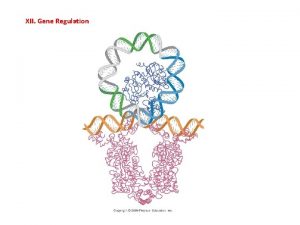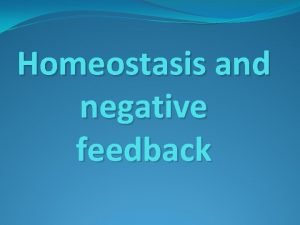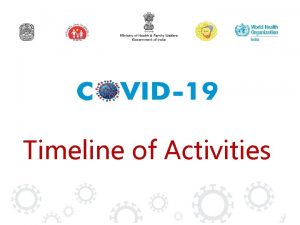Weight Regulation Discovery Timeline Premodern Modern Gluttony Weight






















- Slides: 22

Weight Regulation: Discovery Timeline Pre-modern Modern “Gluttony” Weight Regulation “Sloth” 1994 Physiology / Pathophysiology

Weight Regulation Physiology The body weight Set Point is tightly regulated: • Sensing mechanisms detect environmental changes in food intake (type, quantity) and activity level, as well as adipose tissue content.

Weight Regulation Physiology The body weight Set Point is tightly regulated: • Sensing mechanisms detect environmental changes in food intake (type, quantity) and activity level, as well as adipose tissue content. • Effector systems respond (adapt) with changes in appetite and energy expenditure. Weight loss (or gain) is limited and baseline weight eventually restored

Weight Regulation (Patho)Physiology Overweight and obesity results when leptin resistance (deficiency) occurs, establishing a higher body weight Set Point.

Weight Regulation (Patho)Physiology Overweight and obesity results when the body establishes a higher body weight Set Point. This higher Set Point is tightly regulated to limit weight loss (or gain) and restore baseline weight following caloric restriction (overfeeding).

Overweight and Obesity: Take Home Message Obesity is a Chronic Disease (same as HTN, T 2 DM): • Weight is physiologically (homeostatically) regulated to remain within a normal set range of body weight (set point). • Pathophysiologic alteration in set point leads to defense/maintenance of higher body weight. • Accumulation of excess body fat proportional to body size that leads to impaired health.

Overweight and Obesity: Take Home Message To achieve sustained weight loss, any therapy must ultimately “interfere” with the way that the brain senses and responds to feedback signals, preventing counter-regulatory appetite and energy expenditure adaptions from restoring baseline weight. (and be continued long-term)

Recommendation For Consideration of Pharmacological Weight Management • BMI 27 - 30 kg/m 2 and a weight-related comorbidity: – HTN – Dyslipidemia – Diabetes – Other OR • BMI 30 kg/m 2 https: //www. nhlbi. nih. gov/files/docs/guidelines/prctgd_c. pdf

Pharmacological Weight Management Currently FDA Approved Medications for Weight Loss • tetrahydrolipstatin (Orlistat) (now over the counter as “alli” 60 mg dose) • phentermine (Fastin, Ionamin, Adipex) • phentermine + topiramate (Qsymia) • lorcasarin (Belviq) • bupropion + naltrexone (Contrave) • liraglutide 3. 0 (Saxenda)

Weight Loss Medications Enhance CNS Signaling to Meal-related Signals • • • phentermine + topiramate lorcasarin bupropion + naltrexone liraglutide CNS Hunger Signaling CNS Satiety Signaling

Weight Loss With Phentermine Monroe, et al. BMJ. 1: 352 -54. 1968. • 8 and 37. 5 mg tablets • 15 and 30 mg capsules ~ 9 -10% wt loss

Phentermine: Side Effects and Precautions Short-Term: Adrenergic stimulation • Insomnia • Dry mouth • Increased heart rate and BP • Anxiety Long-term: • BP stable or reduced with weight loss • No addictive behavior demonstrated • Can be continued more than 6 -12 weeks per Qsymia package insert: “…an adjunct to a reduced-calorie diet and increased physical activity for chronic weight management in adult patients…” International Journal of Obesity (2014) 38, 292– 298. Obesity (2011) 19, 2351– 2360. American Journal of Therapeutics (2011) 18, 292– 299

Weight Loss with Phentermine + Topiramate (Qsymia) Garvey WT, et al. Am J Clin Nutr. 2012; 95: 297 -308. -1. 8% -9. 3% -10. 5%

Weight Loss With Lorcaserin (5 -HT 2 C agonist) Smith, et al. NEJM. 2010; 363: 245 -56. -6 %

Weight Loss Medications Enhance CNS Signaling to Meal-related Signals: Lorcaserin Discontinuation rates due to Drug AE’s* • • Placebo – 6. 7 % Lorcaserin – 8. 6 % – Headache 1. 3% vs 0. 8% – Depression 0. 9% vs 0. 5% – Dizziness 0. 7% vs. 0. 2% • No stimulating effects can be used in the cardiovascular patient • If patient on SSRI or other serotonin medications then use with “extreme caution” due to serotonin syndrome risk. *Lorcaserin (Prescribing Information) Woodcliff Lake, NJ Eisai Inc. 2012

Naltrexone and Bupropion SR: Weight Loss Greenway FL, et al. Lancet. 2010; 376(9741): 595 -605 -8 %

Naltrexone and Bupropion SR Adverse Events and Other Effects • Nausea (32. 5 % vs 6. 7%) – (Forced Titration in studies) • Vomiting (10. 7% vs 2. 9%) • Constipation • Headache • Dizziness • Insomnia – Take second dose late afternoon, not late evening • Dry mouth

Naltrexone and Bupropion SR (Contrave ) Adverse Events and Other Effects • Recommend slow titration to start due to nausea • Monitor BP Regularly • Do not give to patient on chronic opioids • Ticlopidine and Clopidogrel (Plavix) – Decrease dose to 1 BID • Seizure risk with bupropion: – Do not give to patients with a seizure history or bulimia – Taper off (do not stop abruptly)

Liraglutide 3. 0 for Weight Management and Type 2 Diabetes Risk Reduction in Pre-diabetes le Roux, et al. Lancet 2017; 389: 1399– 409

Liraglutide 3. 0 Adverse Events and Other Effects • Nausea - 40. 2% – Titrate slowly • Vomiting - 16. 3% • Elevated pancreatic enzymes • Pancreatitis 0. 2% vs. Placebo 0. 0% • Diarrhea – 20. 9% • Constipation – 20. 0% • Acceptable to use in patients with cardiovascular disease • Do not use: – Personal history of pancreatitis – Personal or family history of medullary thyroid cancer (MEN)

Pharmacological Weight Management: Tips • Lifestyle is always attempted first and continued during treatment. • All drugs are Category X for Pregnancy and Lactation. • All drugs have been shown to improve cardiometabolic risk factors. • Weight loss is variable. • Continue treatment long-term (do not stop) unless: – Patient is a non-responder – Side effect(s) emerge • Avoid use of phentermine, phentermine/topiramate ER, and buproprion/naltrexone SR in patients with: – Active CAD/CHF – Untreated HTN – Untreated hyperthyroidism – MAO inhibitors

Obesity (as a disease) Management: Timeline Pre-modern Modern Ave. Weight Loss “Eat less < 5% Move More” Ave. Weight Loss Lifestyle: 1994 Pharmacology: Bariatric surgery: ~ 4% ~6 -10% ~25 -30%
 Modern postmodern timeline
Modern postmodern timeline First circle of hell
First circle of hell Dante's inferno gluttony
Dante's inferno gluttony What is gluttony
What is gluttony The leaky-barrel model of body weight regulation
The leaky-barrel model of body weight regulation Bulk increasing industry example
Bulk increasing industry example Tolerable weight
Tolerable weight Normal ca level
Normal ca level Better regulation cos'è
Better regulation cos'è Serengeti
Serengeti Margit markus moossen
Margit markus moossen Protein regulation
Protein regulation Fgda color wheel
Fgda color wheel What is gene regulation
What is gene regulation Reg cc definition
Reg cc definition Line regulation
Line regulation Basic rules and regulations of table tennis
Basic rules and regulations of table tennis Line regulation formula
Line regulation formula Esf+ regulation
Esf+ regulation Negative feedback in communication
Negative feedback in communication Rate of return regulation
Rate of return regulation Demagnetizing and cross magnetizing
Demagnetizing and cross magnetizing Cushing triad
Cushing triad









































